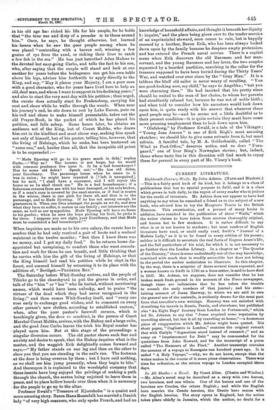CURRENT LITERATURE.
Eighteenth-Century Wails. By John Ashton. (Herat and Blackett.) —This is a fairly good book of its kind, but it belongs to a class of pablioations that has no special purpose to fulfil, and it is a class which grows in bells daily, to the regret of every reader who is jealous for the credit of literature. Mr. Ashton does not appear to have had anything to say when he consulted a friend as to the subject of a new book, who advised him to try the Musgrave Tracts is the British Museum. This examination, and a perusal of many books in addition, have resulted in the publication of these " Waifs," which the writer claims to have taken from sources thoroughly original, and known but to few students. It is rather difficult to say what is or is not known to students ; but most readers of English literature have read, or could easily read, Swift's "Journal of a Modern Lady," as it is to be found in every edition of his poems; neither is it difficult to ascertain the real facts of Eugene Aram's life, and the fall particulars of his trial, for which it is not necessary to go further than the London Library. In a chapter on "The Quacks of the Century," there is some undoubtedly out-of.the•way knowledge, combined with much that is readily accessible but does not belong to the period the author undertakes to illustrate. In this chapter, by the way, there is a misprint of dates several times repeated, and a woman known to Swift in 1736 as a bone-setter, is said to have died in 1837. Mr. Ashton, we suppose, does not consider that he has broken much fresh ground in his account of the Times newspaper, though there are indications that he has taken the trouble to consult the early numbers of that journal; and his enter- taining account of Jonas Hanway, to whom we are said to owe the general use of the umbrella, is evidently drawn for the most part from that traveller's own writings. Hanway was not satisfied with describing his travels in Russia, Persia, and elsewhere, but published also "An Eight Days' Journey from London to Portsmouth," which led Dr. Johnson to say that "Jonas acquired some reputation by travelling abroad, but lost it all by travelling at home,"—a humorous piece of exaggeration which Mr. Ashton might have quoted. His short paper, " Caglioatro in London," contains the original remark that with Carlyle "dogmatism stood instead of research ;" and an essay on Imprisonment for Debt" may be commended for the quotations from John Howard, and for the transcript of a poem called "The Humours of the Fleet." Another transcript contains the account of a voyage to Ramsgate one hundred years ago. It is called "A Holy Voyage,"—why, we do not know, except that the writer makes in the coarse of it some pious observations. There was time for reflection, as the return voyage to London occupied three days.














































 Previous page
Previous page